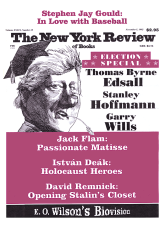In response to:
The Last Word from the August 13, 1992 issue
To the Editors:
In his otherwise engaging review of Samuel Beckett’s late prose pieces, and candid assessment of their publication history, John Banville repeats a few errors that I’m sure he’ll agree ought to be corrected before they cause further mischief. He remarks that: “The (relative) popularity of the piece [Company, (1980)] (written in English, unusually for Beckett, who since Molloy [1951] had first composed in French and then translated himself into English), can be at least in part explained by the air of nostalgia that pervades it. Never before had Beckett dwelt so tenderly on what, on the evidence of Deirdre Bair’s flawed biography, and Eoin O’Brien’s more dependable The Beckett Country, we could recognize as memories of the author’s own past, especially his childhood” [pg. 17].
Beckett returned to English to write the extraordinary play for radio, All That Fall (1955) at the invitation of the BBC. Both it and the subsequent radio play, Embers (1959)—also written in English—are exquisitely tinged with a nostalgia for the Foxrock landscape of his youth that is similar to that invoked in Company and other late prose pieces. Perhaps that is among the reasons why the radio plays meant so much to him late in life: Beckett could quote passages from them from memory in the late 1980s and in response to a question about the “sucking” sound of the waves in Embers directed me to Killeney Beach (near Foxrock), which he described at length, in exacting detail, and with evident pleasure and affection.
Banville’s oversight results from deciding to “confine [his] comments…almost entirely to Beckett’s work in fiction” [p. 18, footnote 16] and from depending on the “flawed biography” for anything but gossip.
Everett C. Frost
Director, The [American] Beckett
Festival of Radio Plays
NYU
New York City
John Banville replies:
I have said before, and take this opportunity to say again, that I have very great admiration for John Calder as a publisher not only of Beckett but of many other “difficult” modern masters. His courage and tenacity over four decades in a cutthroat business have been a steady light in a steadily darkening landscape. However, as I indicated in my review, I believe that he made a mistake in putting together the three texts Company, Ill Seen Ill Said, and Worstward Ho and calling the volume a trilogy—not a very great mistake, perhaps, but one which at the very least will cause confusion among future readers. It is true that Gerry Dukes, in his review of Nohow On which I published earlier this year in The Irish Times, made some of the same points that I made in my NYR review; this does not indicate that I was “unduly influenced,” but simply that Mr. Dukes and I agree that the “trilogy” was an unwise initiative, even if Beckett did approve of it. I sympathize with Mr. Calder (and with Barney Rosset) in the matter of the publishing history of Stirrings Still; however, I am not convinced by his argument that a trade edition of the text would have “killed” demand for the deluxe version. Anyone who knows anything of the publishing trade is well aware that many deluxe editions are issued at the same time as the trade edition, in fact, some of Mr. Calder’s own trade publications carry the information that a deluxe version of the same book is available. As to Mr. Calder’s interpretations of the four texts under discussion, I can only echo him and say that he is entitled to his opinion, and reiterate my opinion that Ill Seen Ill Said does not belong with the other two texts in the volume. It would be futile to labor this point. I am very glad to hear that Barney Rosset has brought out a trade paperback of Stirrings Still, and I hope that it does not kill demand for any remaining copies of the deluxe edition. As to Eoin O’Brien’s The Beckett Country, I am grateful to Mr. Calder for his correction about availability in the United States, for I would not wish to hamper readers eager to find this fine and careful book.
I am grateful also to Everett Frost for pointing out the “few errors” in my review (however, for the life of me I cannot find more than one factual correction in his letter). It is true that in confining myself mainly to a consideration of Beckett’s prose I overlooked the history of the composition of All That Fall and Embers, the former of which I consider one of Beckett’s masterworks, though on a smaller scale than the novels. In conclusion, may I join in the spirit of the thing and correct a “few errors” on Mr. Frost’s part: the beach he refers to is Killiney, and no Dubliner would consider it to be “near” Foxrock.
This Issue
November 5, 1992



